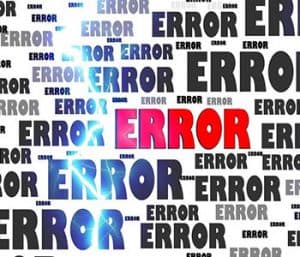
Previously, we wrote about common credit reporting questions and answers and noted that errors can occur. Obtaining your credit report once per year is free, and your score determines how easy or difficult it can be for you to work with lenders. Credit reports contain personal identification information, financial accounts, public records, and the number of views requested by entities. With so much information aggregated by credit bureaus, mistakes are bound to happen. In fact, back in 2012, a study by the Federal Trade Commission, showed that one in four consumers found errors on their credit reports.
In this blog post, we discuss the common errors and what you can do to dispute them.
Think about how easy it is for people or organizations to screw up your personal information. Though the intention isn’t nefarious, these mistakes can create problems, especially when it comes to your credit report. The most common errors you may find when reviewing your credit report include: wrong name, phone number, or address; accounts that belong to other people with the same or similar names as you; and incorrect accounts due to identity theft.
The big three credit reporting agencies–Experian, Equifax, and Transunion–don’t get it right all the time. Closed accounts are often reported as open, and you can be mistakenly identified as the account owner when you are actually just an authorized user. Additionally, your account may be listed as late and contain an incorrect date of your last payment. Scan your listed debts with a fine toothed comb, as there can be duplicates.
A 2017 study by Javelin Strategy & Research concluded that more than 15 million Americans were victims of identity theft in 2016. This can wreak havoc on a credit score if an identity thief uses your information to open an account and not pay the bill.
Accounts with an incorrect current balance or credit limit will ding your credit score. The same goes for multiple instances of accounts with different creditors listed.
According to The Fair Credit Reporting Act, “You have the right to dispute incomplete or inaccurate information. If you identify information in your file that is incomplete or inaccurate, and report it to the consumer reporting agencies, the agencies must investigate unless your dispute is frivolous.”
You can file a dispute with both the credit reporting agency and information furnisher (the creditor) that provided the information to the agency. Send a letter to the agency via certified mail with return receipt requested. Include a copy of your report with the errors highlighted. You can also dispute online and print all records, though this is not recommended because paper trail copies are easier to confirm.
It’s possible you may not be happy with the agency’s resolution, and if that’s the case you can re-dispute the error, reach out to the furnisher, or seek legal assistance from an attorney well-versed in the Fair Credit Reporting Act. It can be a tedious process, but as long as you’re organized, you’ll have a better chance at success.
Remember that each of the three credit reporting agencies generates a report, so it’s critical that you review them individually. For example, if Transunion shows no errors, that doesn’t mean that Experian won’t. It’s also possible that the same error exists on all three. You are your best consumer advocate, and the details of your credit report are too important to ignore.
To put 40+ years of combined experience in your corner, call (847) 200-0401 or contact us online today. We can begin with a complimentary, virtual consultation. Please follow us on Facebook and LinkedIn.